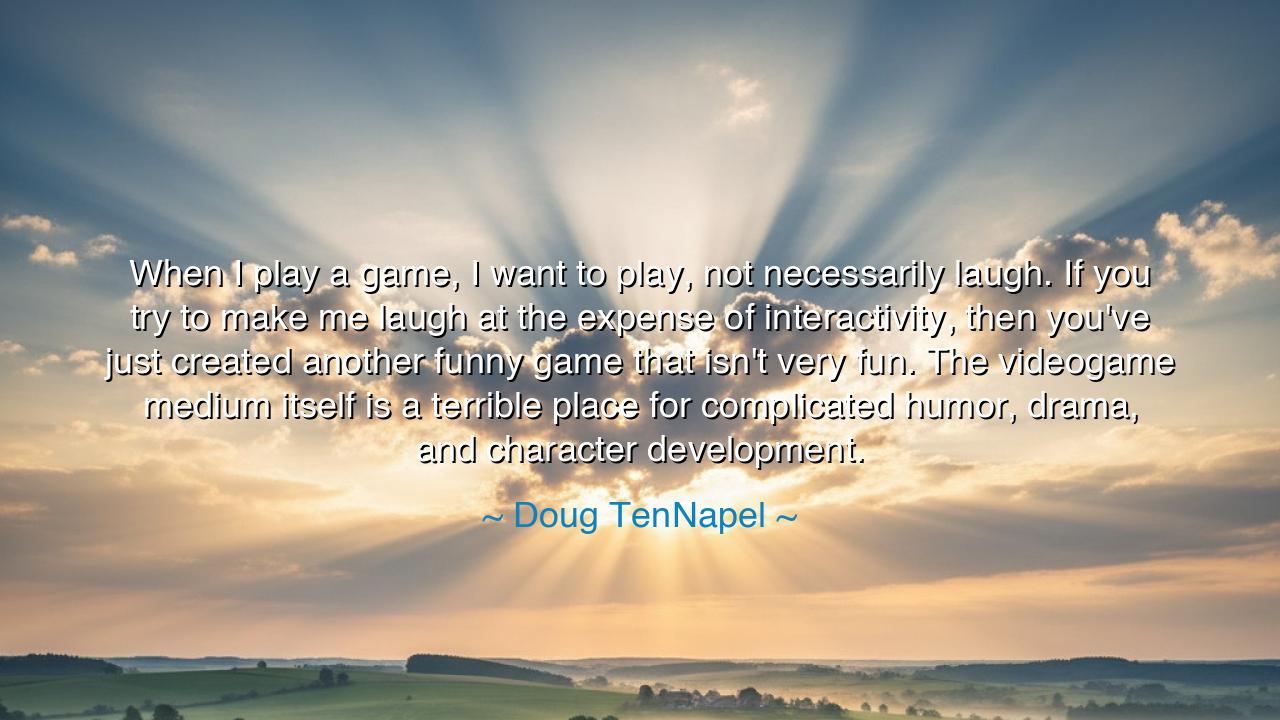
When I play a game, I want to play, not necessarily laugh. If you
When I play a game, I want to play, not necessarily laugh. If you try to make me laugh at the expense of interactivity, then you've just created another funny game that isn't very fun. The videogame medium itself is a terrible place for complicated humor, drama, and character development.






Hear the words of Doug TenNapel, the creator of worlds and shaper of digital myth, who said: “When I play a game, I want to play, not necessarily laugh. If you try to make me laugh at the expense of interactivity, then you’ve just created another funny game that isn’t very fun. The videogame medium itself is a terrible place for complicated humor, drama, and character development.” In this statement lies not cynicism, but discipline; not rejection, but reverence. For TenNapel speaks as an artisan who understands the nature of his craft. He reminds us that every medium has its soul—and to honor that soul, one must not burden it with what it was never meant to bear.
The game, in its essence, is an act of participation. It is not a story told to the player, but a dance shared with them. The player’s hands are not idle; they are the vessel through which imagination becomes movement and purpose becomes challenge. Interactivity—that sacred bond between the mind and the world it commands—is what gives the medium its life. When that bond is broken, when the creator tries to force laughter or emotion through artifice, the living rhythm of the game dies. The experience becomes not a collaboration, but a performance—one where the player is no longer participant, but spectator. And the magic of play, like a flame deprived of air, fades into smoke.
The ancients understood this principle long before circuits and screens. The Greeks, who gave birth to theater, believed that each art form had its proper domain: the spoken word for wisdom, the stage for emotion, the sculpture for beauty, and the contest for glory. The game—their agōn—was the proving ground of human excellence. To break that form by burdening it with another art’s weight was to risk imbalance. Just as the tragedian would not turn his chorus into a wrestling match, so the game designer, TenNapel teaches, must not turn his craft into theater. For while both may hold the spark of story and humor, the heartbeat of the game is its interactivity, not its spectacle.
Consider the wisdom of Shigeru Miyamoto, the father of Super Mario and The Legend of Zelda. When asked why his games inspired such joy, he answered simply: “A good game is one that makes you smile just by playing it.” His worlds are filled with humor, but it is not spoken—it is felt. The joy arises not from dialogue or drama, but from discovery, from motion, from mastery. When Mario leaps, when Link unlocks a hidden secret, the laughter that bursts forth is not crafted by the writer, but by the player. This is the living humor TenNapel speaks of—the kind that emerges from play, not performance.
The origin of TenNapel’s insight lies in his own creation: Earthworm Jim, a game that blended absurd comedy with exhilarating action. It was not the jokes alone that made players laugh—it was the chaos of the experience, the joyful absurdity of leaping through impossible worlds, wielding a ray gun as a worm in a super-suit. Its humor came from interactivity, not interruption. He learned, through his own craft, that when laughter replaces play, the soul of the game is lost. The greatest humor of gaming, he discovered, is not told—it is experienced through struggle, surprise, and triumph.
In this truth lies a broader lesson for all creators: that to honor one’s art is to understand its nature. The sculptor must not wish his statue to sing; the poet must not envy the painter’s colors. Each craft carries its own power, its own limitations, its own glory. TenNapel calls upon all artists, not only those who make games, to listen to the voice of their medium—to let form and purpose be one. When the storyteller forgets his audience’s role, he does not elevate his art; he enslaves it. When the game designer forgets the player’s freedom, he ceases to create a game at all.
Let this teaching be passed down to all who build, who write, who dream: never sacrifice the soul of your creation for the promise of applause. The purpose of a game is to invite, not to dictate; to challenge, not to perform. The purpose of humor is to emerge naturally, like laughter between friends, not to be imposed upon the moment. Create experiences that breathe—where the joy, the laughter, and even the emotion arise from what the participant does, not merely from what they see.
And so remember the wisdom of Doug TenNapel: the strength of a game lies not in its dialogue, nor in its jokes, but in the living pulse of play itself. The player is not the audience—they are the heartbeat of the experience. When we build worlds for them, we must honor that truth. For when the art of interactivity is pure, laughter, drama, and meaning will follow—not as intruders, but as companions. Thus, the true creator is not the one who entertains alone, but the one who shares power with the player—and in doing so, brings the very act of creation to life.






AAdministratorAdministrator
Welcome, honored guests. Please leave a comment, we will respond soon